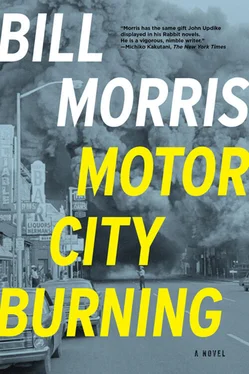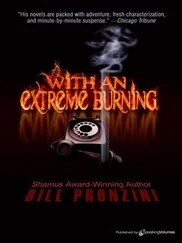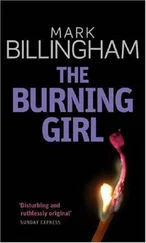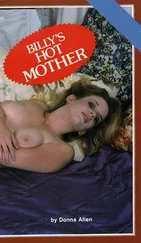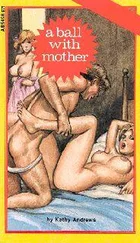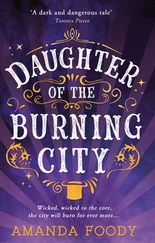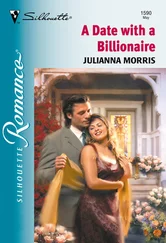Willie devoured such news not because he was shocked or even particularly dismayed by the killing, but because all the images of King had reawakened something in him. Hard as he’d tried to forget what happened during the riot, now he felt a need to remember something that happened long before the riot. Something he thought he’d buried forever. Something he would need to remember — and confront — if he ever hoped to escape from the purgatory he was living in.
All he had to go on was two little words: de Lawd .
His memory, clouded by the poisons he’d ingested during the past year, could tell him only that he first heard those words somewhere in Alabama and that they were uttered by a girl with a voice as soft as satin. He could still hear her voice but could no longer picture her face or remember her name. He had forgotten so much. The one other thing he knew about the girl’s words was that they were dripping with acid and they were directed at King. Hearing a sister deride King as de Lawd had made the floor fall out of Willie’s world, like a trap door had opened beneath him. Everything in his carefully constructed life fell through that trap door — all his beliefs, his ideals, his idols, his faith that the world could be made to change and that he could play some small part in changing it — everything started falling that day. And on the day after King’s funeral, years after he heard those two killing little words, Willie could see with fresh eyes that he was still falling and he wanted to stop.
Watching those ridiculous Georgia mules pull King’s coffin through the wailing mob in Atlanta, Willie understood that if he could recapture the moment when he first heard those two words — if he could relive that moment — he might be able to reassemble the life that fell through that trap door. Then he might be able to tell the story of that life. For the first time in years, thanks to Martin Luther King’s murder, that was what he wanted to do.

He was jolted from his reverie by the shriek of a traffic cop’s whistle. This edition of Detroit’s finest, an Irishman with a cranberry nose, was holding up traffic with a big white-gloved paw so pedestrians could cross Trumbull. Even now, the sight of a Detroit cop sent a hot flash of terror through Willie. He hunched his shoulders and kept his eyes down as he hurried across the street.
When he made it safely to the other side he exhaled, then looked up and saw the great sooty iceberg of Tiger Stadium looming in front of him. It was lovely. Then came the smell of a charcoal fire warming bags of peanuts, tended by a whiskery old man in a hooded sweatshirt. “Roasted peanuts here!” he barked, bouncing from foot to foot to keep warm. “Gitcher hot peanuts!” The man was wearing gloves with the fingertips cut away, just like the gloves people wore to pick cotton back home.
As Willie waited in line at the ticket window, new smells came to him — wind-borne ash and cinders from the city’s smokestacks, a vaguely briny smell off the river, diesel exhaust from idling buses. And then, after he paid fifty cents for a bleacher seat and began ascending the switchbacks that carried fans from the street to the upper deck, he realized he was climbing into a symphony of smells, a single complex aroma that had been composing itself since the first baseball game was played fifty-six Aprils ago in this, America’s oldest big-league ballpark. It was equal parts mustard, sweat, stale beer, urine, popcorn, wet wool, vomit, perfume, cigar smoke and boiled pork. It was that musty smell iron gives off after it has stood in one place through fifty-six scorching summers and fifty-six Arctic winters and an unknowable number of sleet storms and baseball games and football games, half-time pageants and fistfights and pennant drives, after it has absorbed the shuffling of millions of pairs of feet, heard the guttural animal roar of cheers and boos and taunts, after it has housed the whole range of human emotions, from ecstasy to scorn to despair, that touch the lives of people who live in a sports-mad city like Detroit.
He was winded when he reached the upper deck. Pausing to catch his breath, he told himself winter was over and he needed to get back out on the basketball court. He noticed something on the concession stand menus called “Red Hots,” and the cryptic words CRUSH ALL CUPS stenciled on the walls at regular intervals. He had entered a house of mysteries and secret codes. The bleachers were reached by long catwalks suspended by cables from riveted iron girders. Looking down gave him a mild sense of vertigo, so he lifted his eyes to the rectangle of blue sky before him. He saw seagulls. And then he stepped into the sunshine.
Arrayed before him was the most beautiful room he’d ever seen. It was painted green, this irregular open-air room, its upper-deck seats sheltered by a tarpaper roof, the field a luxuriously cross-hatched emerald carpet. The infield dirt was tinged with something black. Coal dust? The bases glowed like sugar cubes.
He climbed toward the big black scoreboard at the top of the bleachers, toward the huge A.C. spark plug shooting through a ring of fire. From up there he could see the spires of downtown, but he turned his back on the skyline and studied this lovely open-air room. The longer he gazed out at the park, the smaller it seemed to become. It was hard to believe the place could hold upwards of 50,000 people. It was so. . so intimate.
The American flag on the roof behind home plate was at half-mast, as he’d expected, and the pennants of the American League teams rimming the roof were all crisply horizontal from the river wind that cleared the roof on the first base side and galloped across the outfield. He was glad he’d worn a sweater under his nylon windbreaker. He wondered how it was humanly possible to watch the Lions play football in this place in the middle of December.
By the time a fat man in a tuxedo stood behind home plate and sang the National Anthem, the bleachers were nearly full. It was not going to be a sellout, but it was a fine surly crowd. After a minute of itchy silence for Martin Luther King, everyone stood and roared as the Tigers were introduced and sprinted out to their positions. The loudest cheers were for Al Kaline, the veteran right fielder, and Willie Horton, a home-grown hero, a powerful black slugger who tipped his cap as he jogged to his position in left.
A black pitcher named Earl Wilson strode to the mound and began warming up. Of course Willie knew there were black pitchers in the major leagues. He’d listened to St. Louis Cardinals games on KMOX radio since he was a boy, and he would never forget the seventh game of the 1964 World Series. He had just returned to his apartment in Tuskegee to write about the fires he’d walked through during that so-called Freedom Summer, and the Series came as a welcome distraction. A bunch of his old college buddies crowded into his apartment for the seventh game because he had the best radio reception and the coldest beer in town and because Bob Gibson, the intimidating black pitcher, was starting the game for the Cardinals. Surely Gibson understood that there were brothers crowded around radios like this all over the country, hanging on his every pitch, hoping he could put down the vaunted Yankees, the whitest of dynasties, and lay to rest the myth that black people were lazy, that they weren’t as mentally tough as whites, that they couldn’t be trusted with jobs as momentous as pitching the deciding game of the World Series. Gibson pitched brilliantly, then gave up two runs in a tense ninth inning before getting the Yankees’ dangerous second baseman, Bobby Richardson, to pop up, sealing the Cardinals’ victory.
Читать дальше
